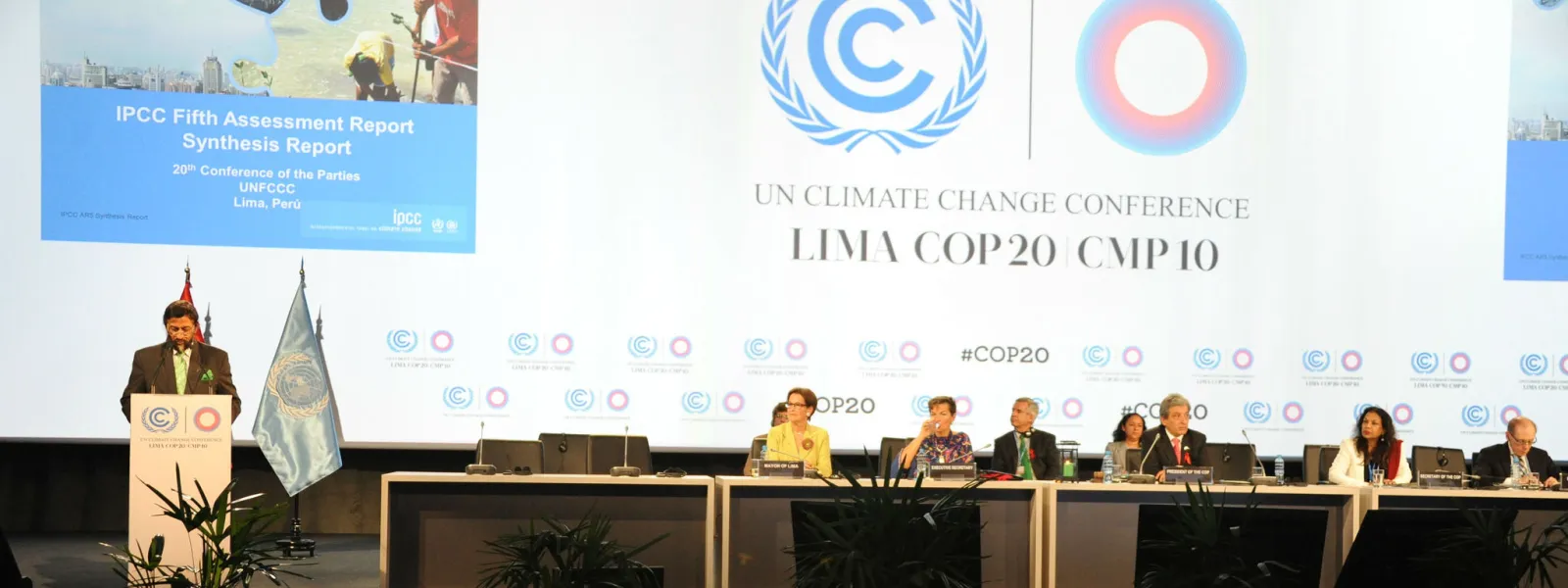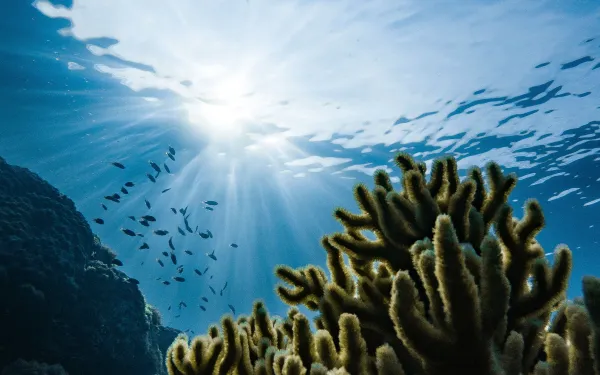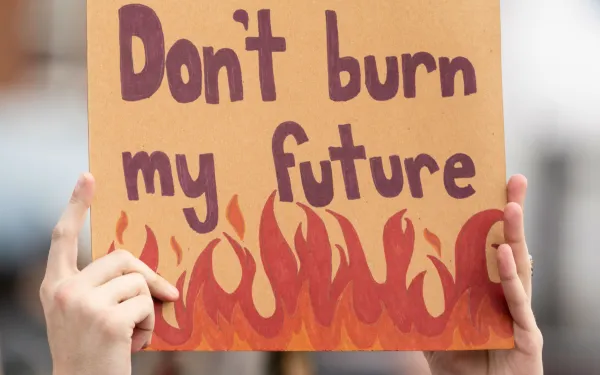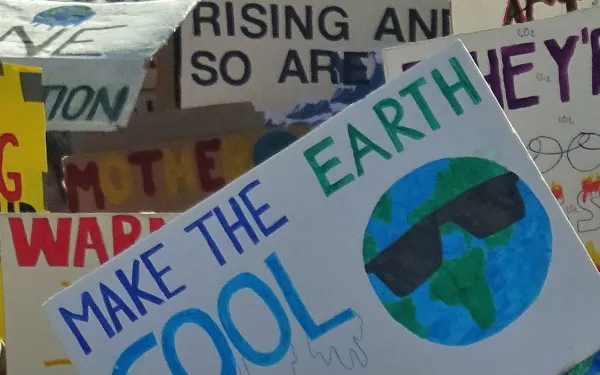
Project
Photo: UNFCCCMonitoring the UN Climate Negotiations
As changes in climate become more extreme, their affects are being hardest felt throughout developing countries. Since 1994, the United Nations Framework Convention on Climate Change has laid out actions to limit the increase of global average temperatures and confront the impacts of climate change.
The States that are Parties to the Convention meet every year in the so-called Conference of the Parties (COP) to review their commitments, the progress made in fulfilling them, and pending challenges in the global fight against the climate crisis.
At COP21 in 2015, they adopted the Paris Agreement, which seeks to strengthen the global response to the climate emergency, establishing a common framework for all countries to work on the basis of their capacities and through the presentation of Nationally Determined Contributions (NDC) that will:
- Limit the increase in global temperatures to 2°C compared to pre-industrial levels and continue efforts to limit it to 1.5°C;
- Increase the capacity of countries to adapt to the impacts of climate change; and
- Ensure that financing responds to the goal of reducing greenhouse gas emissions.
Our focus areas
THE CLIMATE CRISIS AND HUMAN RIGHTS
The climate crisis, due to its transversal character, has repercussions in various fields, geographies, contexts and people. In this regard, the Preamble to the Paris Agreement states that it is the obligation of States to "respect, promote and fulfill their respective obligations on human rights, the right to health, the rights of indigenous peoples, local communities, migrants, children, persons with disabilities and people in vulnerable situations and the right to development, as well as gender equality, the empowerment of women and intergenerational equity."
AIDA at the COP
COP25: Chile-Madrid 2019
At COP25 in Madrid, Spain, we advocated for the inclusion of the human rights perspective in various agenda items. We promoted the incorporation of broad socio-environmental safeguards in the regulation of Article 6 of the Paris Agreement, which refers to carbon markets. We closely followed the adoption of the Gender Action Plan, as well as the Santiago Network, created "to catalyze technical assistance […] in developing countries that are particularly vulnerable to the adverse affects of climate change." We also encouraged the inclusion of ambitious and measurable targets for the reduction of short-lived climate pollutants in the climate commitments of States.
Related projects
Latest News

Ocean scientists and NGOs call time on government neglect of earth’s life support system
The Intergovernmental Panel on Climate Change (IPCC) Special Report on the Ocean and Crysophere in a Changing Climate reveals the extent of the crisis facing humanity as the ocean and its services begin to show signs of collapse. Although the ocean is inextricably linked with the climate, the two working together to make planet Earth habitable, this is the first time that the IPCC has turned its attention to the marine realm. The resulting report conveys what marine scientists and NGOs have been saying for years, that the ocean is beginning to crumble under an onslaught of needless stressors from overfishing to pollution, compounded by climate breakdown. The effect of climate breakdown is the most serious, creating acidification, heating and deoxygenation. These three factors have been present in every mass extinction event in Earth’s history; all three are active in the ocean now. Professor Dan Laffoley of the IUCN World Commission on Protected Areas: “We are an ocean world, run and regulated by a single ocean and we are pushing that life support system to its very limits through heating, deoxygenation and acidification. We are well past 'wake up calls' - what we need now is enlightened self-interest to deliver the actions that protect the ocean and climate and which in turn protect and support humanity.” The timescales at work within the ocean mean that changes already put into its system – such as warming – will remain at work for hundreds of years, consequently, even with immediate action to curb temperature rise and cut CO2 emissions, ocean services to the planet could still be at risk. This is why it is so important that all extraneous stressors on the ocean which can be controlled, are. Overfishing, pollution, destruction of habitats, ecosystems and biodiversity are all stressors which can be stopped to support the resilience of the ocean to withstand the climate crisis. Gladys Martínez, senior attorney of the Interamerican Association for Environmental Defense (AIDA): “The IPCC report makes it crystal clear that time is running out for ocean action. We have a small window of opportunity to achieve a strong High Seas Treaty by 2020 and to protect at least 30% of the ocean by 2030, two measures that will help defend the resilience of the ocean. The treaty is being negotiated before the United Nations and states must complete it by 2020, in line with the UN General Assembly resolution and demonstrating high ambitions.” Although the picture painted by the IPCC is undeniably bleak, there are measures which can be taken now to help bolster the resilience of the ocean and which governments need to finally and robustly take action on. State parties to the legally binding Convention on Biological Diversity will negotiate new targets to protect biodiversity at a meeting in 2020. The target for marine biodiversity should be to protect at least 30% of the ocean through implemented highly and fully protected areas, with the remaining 70% of the ocean sustainably managed. Bringing an end to overfishing and pollution in all its forms and preventing further biodiversity, ecosystem and habitat loss are essential measures within our reach. Tackling climate breakdown and holding warming at or as close to 1.5 degrees Celsius as possible is essential if the ecosystem services of the ocean are to survive. All states need to commit to new and more ambitious plans (NDCs) in 2020 to achieve this. Press contacts: Victor Quintanilla in Mexico - [email protected], +521 5570522107 Patricia Roy in Paris - [email protected], +34 696 905 907 Mirella von Lindenfels in London - [email protected], +44 7717 844 352 Karen Rausch in Santiago - [email protected], +56 967354769 Sophie Hulme in NYC - [email protected], +44 7973 712869
Read more
200 environmental and human rights leaders pledge to tackle climate emergency together
New York – In an unprecedented move, more than 200 representatives of Indigenous Peoples, workers, academia, environmental and human rights groups adopted a landmark declaration calling on governments and corporations to urgently tackle the climate emergency in order to ensure the survival of humanity. Gathered for the Peoples’ Summit on Climate, Rights and Human Survival, their goal is to unleash new power, energy, and resources to supercharge a connected, diverse, and action-oriented mass movement to overcome the climate crisis, by putting people and human rights at the core of its solutions. These leaders and their groups seek to put pressure on governments and corporations to ramp up climate commitments. Among other initiatives, they plan to pursue more concerted climate litigation efforts, target the financial sector’s funding of fossil fuels, make more effective use of human rights accountability mechanisms, and coordinate more mass mobilization campaigns at national and regional levels. They also expect to agree on the implementation of a set of related action plans in the following months. The Peoples’ Summit was organized by the United Nations Human Rights Office, Greenpeace International, Amnesty International, Center for International Environmental Law, Wallace Global Fund, and the New York University School of Law Center for Human Rights and Global Justice. The event is taking place on September 18 and 19, ahead of the United Nations Secretary General’s Climate Action Summit. Craig Mokhiber, New York Office Director at the United Nations Human Rights Office, said: “For those on the frontlines, climate change is already eroding the rights to food, water and sanitation, decent shelter, health, personal security, and even life itself. Many on small island states, in coastal communities, and in areas subject to creeping desertification are watching their right to self-determination slip away. Large-scale climate displacement threatens to force millions to undertake journeys of vulnerability and uncertainty. Ultimately, the adverse effects of climate change tear at the very fabric of human society. Every country must take urgent and meaningful action to address this threat to human rights. By bringing together the many strands of the climate justice movement, we seek to mobilize transformative, rights-based and inclusive climate action now.” Jennifer Morgan, International Executive Director at Greenpeace International, said: "The climate crisis is a human rights crisis. The human consequences of extreme weather disasters can be staggering, as we can see by the profound devastation and destruction left in the wake of Hurricane Dorian. This declaration marks a new era of climate activism. Lead by the youth and together with our allies, we will all take action and confront those responsible. Weak governments and toxic corporate power will have nowhere to hide as we put people at the center of our demands, and seek climate justice for the communities least responsible but most vulnerable to this climate emergency.” Kumi Naidoo, Secretary General at Amnesty International, said: “The world’s most urgent struggle needs the power and diversity that the global people’s movement for human rights can bring. We come with key constituencies, energy, and skills to the fight for climate justice. But we have been punching way below our weight so far. “Amnesty intends to do its part to change this. We want the Summit to help unleash the potential of the global human rights movement to protect present and future generations. United, we win.” Carroll Muffett, President and CEO at the Center for International Environmental Law, said: “The costs of continued inaction in the face of the climate crisis are measured in human rights, human livelihoods, and human lives. As Hurricane Dorian reminds us all too painfully, those costs are real and they are rising. Today’s declaration reflects a common commitment within the human rights community to put human rights at the center of the climate crisis, to phase out the fossil fuels that are driving that crisis, and to hold governments and companies accountable when they stand in the way.” Ellen Dorsey, Executive Director at Wallace Global Fund, said: “The human rights sector and movements from around the world are bringing new resources, a powerful global constituency of supporters, and unique human rights advocacy to the climate movement, calling for actions by governments and corporations commensurate with the scale and rapid pace of climate change to ensure the survival of humanity.” Philip Alston, Center for Human Rights and Global Justice Chair at New York University School of Law, said: “Climate change has been called a ‘false alarm’, but it is an alarm that will end up killing many of our children, and at least some of us. We read daily about large numbers of people dying of heat exposure, being drowned in floods or burned in wildfires, or just forced to flee their homes, but we fool ourselves that it won’t happen to us. While many of us are distracted on social media or determined to get on with normal life, the future disasters flowing from climate change are moving from possibilities to certainties. Human rights as we know them will be rendered increasingly meaningless unless we act immediately.” Link to the online declaration. Press contacts in New York: Amanda Kistler, [email protected], +1 202-742-5832 Kharunya Paramaguru, [email protected], +44 7508-394415 Lauren Stackpoole, [email protected], +1 212-998-6069 Rodrigo Estrada, [email protected], +1 202-344-9292
Read more
Declaration: Peoples’ Summit on Climate, Rights and Human Survival
We envisage a world where people thrive as part of nature and where human rights – including the rights of Indigenous Peoples – and the environment come before corporate profit, in an era in which people are more connected with each other and with the planet. We want to live in safe, equal, peaceful and just societies. In societies where every individual and all communities enjoy fair, secure and sustainable livelihoods; participate in decision-making on matters that affect their lives; and have access to information and justice. In a world where the commons are protected and sustainably managed by communities, and where governments and corporations act responsibly and are accountable for the consequences of their actions. We see the opportunity and urgent need to transform our economic, social, legal and political systems to ensure equity and the protection of human rights, to halt the climate crisis and mass extinctions, to protect our children’s future, to hold polluters accountable for their actions, and to make fossil fuels and all unsustainable business practices a relic of the past. We believe that this vision requires protecting, supporting and being in solidarity with those who are suffering from the violence of the climate crisis and those fighting for climate justice.The climate crisis can and must be addressed. An array of effective policy and technical solutions are already known, available and immediately deployable. Governments and corporations bear the primary responsibility for taking the actions that could address and reverse the drivers of climate change and build resilient, adaptable and sustainable communities. We will invigorate our existing efforts around mobilizing the most powerful, united and diverse Peoples’ movement ever assembled. Real and transformative climate action will not be possible without a fully-engaged civil society and population.To achieve climate justice, we, the undersigned, agree to the following:We will increase our efforts to place human rights at the core of climate activism. We will do so by following the lead of Indigenous Peoples, youth, women, people living in poverty, persons with disabilities, fisherfolk, peasants, pastoralcists, local communities, workers, and other disproportionately-affected groups, who are leading the call for climate justice and against activities that destroy the planet. We will demand immediate, bold, people-powered and human rights-consistent action of unprecedented scale to reduce greenhouse gas emissions, in order to protect people, ecosystems, and biodiversity from the climate breakdown. Such actions require transformative change of our economic, social and political systems, to address inequalities in all aspects of life. This transformative change includes the equitable distribution of resources, particularly reducing the unnecessary consumption of resources by privileged groups. It is essential that we achieve drastic and rapid reductions in emissions globally and a fossil-free future, to keep the temperature rise as low as possible and no higher than 1.5°C degrees, as current levels of warming are already resulting in human rights violations. We will demand that all government climate policies, measures, and actions respect, protect and fulfil human rights – including the right of people to be fully informed and empowered to participate in a meaningful way in climate decision- making – and that corporations fulfil their responsibilities to respect human rights across their supply chains. We will oppose any policy or action taken to combat climate change or support adaptation that comes at the cost of human rights, and those that would deepen inequalities and cause impoverishment, hunger, dispossession, and economic, social and political exclusion. We will increase the pressure on those countries and corporations most responsible for climate change and with the most resources available. We demand that all countries urgently establish and enforce science-based emission reduction targets compatible with the protection of human rights, and that they meet these targets on or ahead of schedule. We will oppose attempts to transfer the burden and responsibility for change from high-emitting countries to countries with fewer resources and lower historical emissions, and from corporations and privileged groups to less-privileged groups. We will compel those bearing more responsibility for the crisis to own their actions and take measures accordingly. We will call upon those States with the greatest responsibility for climate damage and with the most resources to provide the necessary financial and technological resources to countries in the global south to facilitate their ambitious actions for climate change mitigation and adaptation. We demand that those States also provide adequate means – including compensation – to affected communities and individuals to address the loss and damage caused by the climate crisis, in full consultation with them and respecting their individual and collective customs and rights. We will promote transparency and adequate use of those resources and will oppose the creation of additional financial burdens and debts as a result of this support. We will relentlessly challenge corporate capture of policies and institutions, and we will hold accountable climate destructive industries and their financial backers. We will demand a just, fair and inclusive transition away from fossil fuels and towards sustainable agriculture and renewable energy that empower Indigenous Peoples, workers, peasant farmers, pastoralists, fisherfolk, and communities, rather than disenfranchise them. We will seek measures to ensure that all people, particularly those facing discrimination, have access to climate education and to the resources, training, knowledge, and decent jobs required for a people-powered transition to a decarbonized and resilient society. We will work for the protection, respect, and fulfilment of the rights of Indigenous Peoples, including to their ancestral lands and territories. We will seek the protection, recognition, and promotion of local and traditional knowledge that has proven effective and appropriate in addressing the climate crisis as well as enabling the transition and resilience so urgently needed in our food systems, always with the consent of, and for the benefit of, Indigenous Peoples. We will demand effective and adequate access to justice for individuals and communities whose rights are impacted by the climate crisis or lack of climate action – including those facing climate-induced loss and damage and those whose rights are threatened due to climate-related displacement. We will work to ensure that they are able to enjoy access to justice and effective remedies and that those responsible for climate harms are held to account. We will proactively use national, regional and international human rights bodies and legal instruments to ensure that human rights and obligations are effectively upheld to promote climate justice. We will support all environmental human rights defenders, in particular those who individually and collectively protect their territory, access to land, livelihoods, and the environment, and those campaigning to defend the people and the planet from destructive activities and climate breakdown. We will demand a safe and enabling environment in which all human rights defenders, particularly those facing multiple and intersecting forms of discrimination and inequality, are effectively protected and able to defend and promote human rights without fear of punishment, reprisal, or intimidation. Read the full declarationRead the declaration in SpanishRead the declaration in Portuguese
Read more